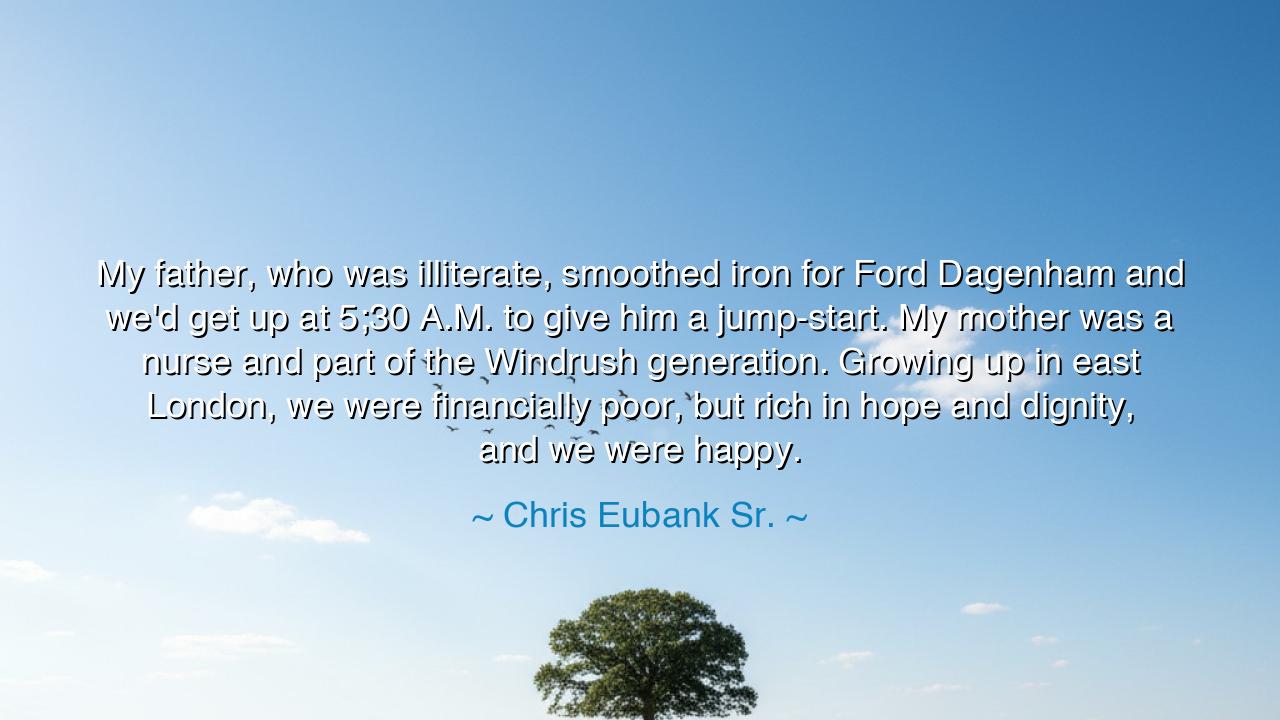
My father, who was illiterate, smoothed iron for Ford Dagenham
My father, who was illiterate, smoothed iron for Ford Dagenham and we'd get up at 5;30 A.M. to give him a jump-start. My mother was a nurse and part of the Windrush generation. Growing up in east London, we were financially poor, but rich in hope and dignity, and we were happy.






In the councils of memory, hear Chris Eubank Sr. speak a humble creed: “My father, who was illiterate, smoothed iron for Ford Dagenham and we’d get up at 5:30 A.M. to give him a jump-start. My mother was a nurse and part of the Windrush generation. Growing up in east London, we were financially poor, but rich in hope and dignity, and we were happy.” In a few plain strokes he paints a house of small means and great wealth—hope, dignity, and happiness counted not in coins but in customs: early rising, family duty, reverence for work, and gratitude for one another. The line is a blessing disguised as biography, teaching that character can be minted in scarcity and that honor can be learned beside a sputtering car at dawn.
The meaning moves on two rails. First, the father: illiterate, yet expert—“smoothed iron” on long shifts at Ford Dagenham, a craft that asked the back to carry what the books had not taught the hand. The family’s 5:30 summons to “jump-start” his car is more than a detail; it is a liturgy of solidarity. Second, the mother: a nurse of the Windrush generation, one of those men and women from the Caribbean who answered Britain’s post-war call, staffed its newborn NHS, and bore both the hope of rebuilding and the ache of being strangers in the land they were told was home. Eubank gathers these two rails—industrial Britain and migrating Britain—and shows how a child’s track could run straight upon them.
As to origin, the wording is preserved in reputable quotation collections and mirrors fuller accounts in interviews and memoir. In his autobiography he recalls his father’s Dagenham shifts and the family rising around 5 a.m. to jump-start the Cortina; a newspaper profile years earlier links the same facts with his mother’s nursing and Windrush roots. The sentence we ponder is thus no stray epigram; it is the distilled refrain of Eubank’s own telling of where he came from and what formed him.
Set his memory within the larger story. Ford Dagenham was a cathedral of post-war labor, where thousands shaped metal into mobility. Beside such forges, the Windrush nurses turned wards into places of healing—an unglamorous, indispensable work that knit a bomb-worn island back together. To say “we were financially poor, but rich in hope and dignity” is to testify that these two currents—factory and ward, iron and care—could make a home rich in ways a ledger cannot reckon.
A small parable makes the wisdom plain. Picture an east-London morning: grey sky, cold breath, a boy in a school jumper holding the torch while his father leans into the bonnet—hands blackened, jaw set, the starter whining. The engine coughs to life. No speech is given; a covenant is kept. That night the mother returns from the late shift—feet sore, heart soft—and places a story and a sandwich on the table. The boy learns two alphabets: the alphabet of work and the alphabet of care. Years later, under lights and belts and belts of pressure, he will speak them both—discipline from the plant, poise from the ward.
History offers a sterner mirror. When Britain later forgot its promise and some in power treated the Windrush children as if they were guests without welcome, it was the memory of such homes—poorer in cash, richer in contribution—that shamed the policy and stirred repair. The lesson returns: a nation’s greatness lies not only in whose names crown its buildings, but in whose hands keep its engines running and its sick attended. Dignity is the coin of their realm, and hope is its interest.
What, then, shall we take from Eubank’s saying? First, that poverty is not a verdict on worth; it is a stage on which hope and dignity can be acted daily—by rising early, helping kin, and honoring craft. Second, that inheritance is more than property; it is posture. We inherit steadfastness by practicing it, gratitude by naming it, and courage by standing up for those who carried us here. Third, that identity can be forged where iron meets mercy—in the meeting of necessary labor and necessary love.
Therefore make a rule for your own house. Keep an early-morning ritual of service—some small “jump-start” you do for another. Learn a skill that stains your hands and a kindness that softens your voice. Tell the stories of your elders—the illiterate who were wise, the migrants who healed strangers—so that your children know the price of their present and the marrow of their name. Be “rich in hope and dignity,” and you will find, as Eubank did, that such riches outlast salary and applause; they build a life that can stand the bell and the storm, and call itself—without boast—happy.






AAdministratorAdministrator
Welcome, honored guests. Please leave a comment, we will respond soon